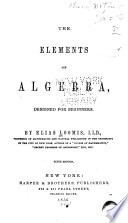 | Elias Loomis - Algebra - 1856 - 280 pages
...terms the exponent of a diminishes by unity until we reach the last term which does not contain a. The exponent of b in the second term is 1, and increases by unity in each term to the right, until we reach the last term in which the exponent is the same as... | |
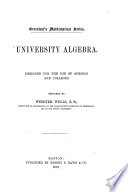 | Webster Wells - Algebra - 1879 - 468 pages
...exponent of a in the first term is 6, and decreases by 1 in each succeeding term. The exponent of x in the second term is 1, and increases by 1 in each succeeding term. The coefficient of the first term is 1 ; of the second term, 6 ; if the coefficient of the second term,... | |
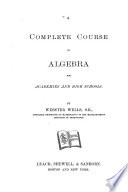 | Webster Wells - Algebra - 1885 - 370 pages
...term is the same as the exponent of the binomial, and decreases by 1 in each succeeding term. III. The exponent of b in the second term is 1, and increases by 1 in each succeeding term. TV". The coefficient of the first term is 1 ; and of the second term, is the exponent of the binomial.... | |
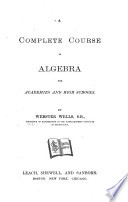 | Webster Wells - 1885 - 368 pages
...exponent of a in the first term is 5, and decreases by 1 in each succeeding term. The exponent of x in the second term is 1 , and increases by 1 in each succeeding term. The coefficient of the first term is 1 ; of the second term, 5 ; multiplying the coefficient of the... | |
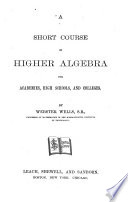 | Webster Wells - Algebra - 1889 - 584 pages
...less by 1 than the exponent of a in the dividend, and decreases by 1 in each succeeding term. III. The exponent of b in the second term is 1, and increases...IV. The terms are all positive when the divisor is a — &, and are alternately positive and negative when the divisor is а + b. 100. In connection with... | |
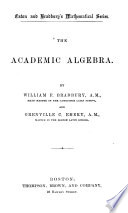 | William Frothingham Bradbury, Grenville C. Emery - Algebra - 1889 - 428 pages
...one less than the degree of the binomial, and decreases regularly by unity in each successive term ; the exponent of b in the second term is 1, and increases regularly by one in each successive term, till in the last term it becomes the same as the exponent... | |
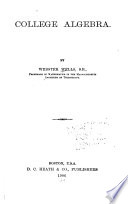 | Webster Wells - Algebra - 1890 - 604 pages
...term is less by 1 than its exponent in the dividend, and decreases by 1 in each succeeding term. III. The exponent of b in the second term is 1, and increases by 1 in each succeeding term. • IV. If the divisor is a — b, all the terms of the quotient are positive ; and if the divisor is a + b,... | |
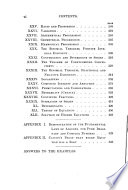 | Webster Wells - Algebra - 1890 - 560 pages
...exponent of a in the first term is 5, and decreases by 1 in each succeeding term. The exponent of x in the second term is 1, and increases by 1 in each succeeding term. The coefficient of the first term is 1 ; of the second term, 5 ; multiplying 5, the coefficient of... | |
 | William Frothingham Bradbury, Grenville C. Emery - Algebra - 1894 - 144 pages
...one less than the degree of the binomial, and decreases regularly by unity in each successive term ; the exponent of b in the second term is 1, and increases regularly by one in each successive term, till in the last term it becomes the same as the exponent... | |
 | Webster Wells - Algebra - 1897 - 434 pages
...term is less by 1 than its exponent in the dividend, and decreases by 1 in each succeeding term. III. The exponent of b in the second term is 1, and increases by 1 in each succeeding term. IV. If the divisor is a — b, all the terms of the quotient are positive ; if the divisor is a + b, the... | |
| |